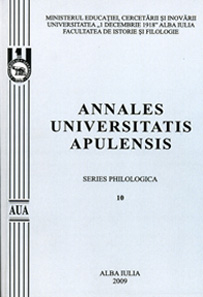LA FIGURE DE LA MÈRE CHEZ DOMINIQUE FERNANDEZ.
DE LA PSYCHOBIOGRAPHIE APPLIQUÉÉ À MICHEL-ANGE AU TEXTE ROMANESQUE
THE MOTHER’S IMAGE IN DOMINIQUE FERNANDEZ’S NOVELS. FROM THE PSYCHOBIOGRAPHY APPLIED TO MICHELANGELO TO THE LITERARY TEXT
Author(s): Simona JisaSubject(s): Literary Texts
Published by: Universitatea »1 Decembrie 1918« Alba Iulia
Keywords: psychobiography; art; novel; maternal images; Michelangelo
Summary/Abstract: Dominique Fernandez is known as an eclectic personality in the French culture. He is not only an academic, a novelist, literary and art exegete, traveller, translator, journalist, theoretician, but also the psychobiography’s creator as a method of the literary work analysis. In the book entitled L’Arbre jusqu’aux racines. Psychanalyse et création and in the next volume, Einstein. L’Arbre jusqu’aux racines. II, he explains this method’s advantages that set concomitantly the individual’s life and the literary work, each of them being explained through the interpretation of the other. The psychobiographer’s work is difficult due to the necessity for discovering the childhood trauma that marked the individual’s whole life and artistic work. Psychoanalysis is surmounted by the theoretician since, besides the trauma with sexual implications, the psychobiographer is a creator especially in that place where he must use his imagination for filling in the gaps left by the official biography or by the documents’ absence. In our paper, we present the mother’s image from the biographer’s perspective. We start from the example given by the exegete in his quoted book through the analysis of the mother’s figure at Michelangelo, in order to analyze the mother types depicted in his novels. Therefore, Michelangelo lives the experience of an absent mother (being an orphan in his childhood), and this trauma is visible in his paintings and sculptures, where the mother keeps up her eternal beauty, but at the same time she never has visual contact with her son. The mother types from the novel are either dominative (unnerving) inhibiting the child’s personality, or weak, unable to get rid of the father’s dominance and who accept the child as s/he is. Our analysis takes into account the book entitled Ramon, the author’s father’s biography. In elucidating the mystery of this controversial personality (a refined literary exegete, a person with an immense social success, Proust’s friend, but a loser as husband and father), Dominique Fernandez analyzes the implications of his mother’s and grandmother’s personality upon Ramon Fernandez. The historical context where the unconscious throbbings of his personality are revealed is one of the most unfavourable ones. The son cannot explain himself why his father chose to collaborate with the Nazi regime and the book is also a detailed investigation of the impact that the family has upon the individual. The conclusion of Dominique Fernandez’s novels is that, in most cases, the son asserts himself as individuality just on the artistic level, the personal one being a real failure. The mother’s image is a reference point for any choice that the son will make in his life and career; this won’t be a revolt against his mother, on the contrary, there is an unconscious desire to imitate her, to obey either his mother or his father.
Journal: Annales Universitatis Apulensis. Series Philologica
- Issue Year: 11/2010
- Issue No: 3
- Page Range: 250-261
- Page Count: 12
- Language: French

